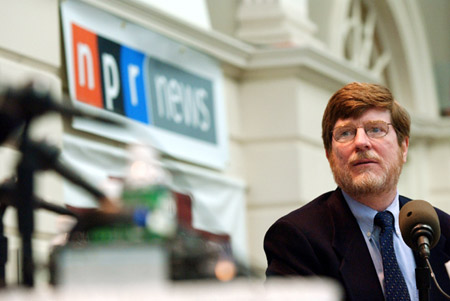School testing is talk of the nation
Tendentious issue sparks debate, discussion at GSE

“Testing, testing.”
The familiar sound-check was also the topic of discussion when National Public Radio’s call-in show “Talk of the Nation” brought its microphones to the Harvard Graduate School of Education (GSE) Thursday, March 21, for a live broadcast.
In conjunction with the PBS “Frontline” documentary “Testing Our Schools,” the two-hour live program, broadcast in front of an audience in the GSE’s Askwith Auditorium, examined what “Frontline” correspondent John Merrow Ed.D. ’73 called “the good, the bad, and the ugly” of standardized testing in schools.
From Massachusetts, where the embattled MCAS test is considered one of the best-designed tests in the nation, to California, where the one-size-fits-all Stanford 9 test is Merrow’s “ugly” example, standardized tests and the educational standards they’re meant to measure are now in place in all 50 states. Launched in response to the landmark 1983 report “A Nation at Risk,” which warned that America’s schools were failing, tests and standards are a key component of President Bush’s sweeping education reform bill.
Both the “Frontline” documentary, which aired on PBS March 28, and the “Talk of the Nation” broadcast explored what high-stakes standardized tests those which link test scores to graduation are really measuring and how standards are changing both teaching and learning. Educators and experts, including GSE faculty members Dan Koretz and Paul Reville, joined “Talk of the Nation” host Neil Conan and a feisty ensemble of participants who asked questions in person as well as by phone and e-mail.
Tests are good … to a point
Standards and accountability are positive forces in education reform, panelists agreed, and high-stakes tests, while still imperfect, are here to stay.
“Standards are a good thing. … Standardized tests are a good thing,” said Merrow, a guest in the show’s first hour, along with Koretz and Jeff Howard, founder and president of the nonprofit training and consulting organization the Efficacy Institute.
The flaw, said Merrow, is in multiple-choice tests, which so many standardized tests are. Too often, he said, these limited tests drive what is taught. “You get the tail wagging the proverbial dog.”
Standardized tests are poor measures of student or school quality, said Koretz, professor of educational assessment at GSE. “All tests do is describe, they don’t explain,” he said. “You should never make measurements about a child based on a single test.”
Howard, much more upbeat about standardized tests, argued that controversial high-stakes nature of some tests creates much-needed accountability. In the decades before standardized tests became the norm, he said, public education ran a very wide gamut from good to appalling. “Since there were no standards for anything, anything went,” he said.
Yet even Howard agreed that standardized tests cannot measure qualities elusive to pencil and paper, such as creativity or ingenuity. “There’s no question that we are putting much too much on this test,” said Koretz.
Merrow concurred, arguing for multiple measurements of student and school quality, such as grades, attendance, and teachers’ qualifications. “It really is a fallacy to think we can find this one quick fix,” he said.
The view from the schools
“Talk of the Nation’s” second hour brought two educators Worcester Public Schools Superintendent James Caradonio Ed.D. ’91 and Linda Nathan Ed.D. ’95, headmaster of Boston Arts Academy to the microphone to discuss the impact of testing on teaching and learning. Their experiences contrasted sharply.
Caradonio said that by using the tests as diagnostic tools his district has improved the quality of teaching and learning. “In 30-something years of education, [I] have never seen so much conversation and focus on teaching and learning as I have in the last 10 years,” he said.
Nathan, who is also a parent, has “not seen the promise of MCAS,” she said. “I have seen a single, 27-hour high-stakes test that I think has the ability to destroy our schools. What I do as principal is to try to stay the course.”
In favor of standards, assessment, and rigor, Nathan advocated for the MCAS to be one part of an assessment that might also include grades and other measures of performance. She is confident that her school’s high MCAS scores the highest of Boston’s nonexam schools are the direct result of coaching by the Princeton Review testing counselors she hired. “I think we’re focusing on the wrong issues,” she said.
Perhaps the youngest member of the audience, Braintree High School junior Mark “Pete” Peterson, shared a story of MCAS fallibility. Peterson, who is also featured in the “Frontline” documentary, stumbled on an error in a multiple-choice geometry question on the MCAS. While he passed the exam, he spent so much time grappling with the problem that he may have jeopardized his performance on the rest of his test, he said.
Reville, GSE lecturer and chair of the Massachusetts Education Reform Review Commission, emphasized that education reform was about standards, not the test. Yet the high-stakes MCAS has had a positive effect, he said.
“The stakes in Massachusetts, however imperfect, have created an edge of urgency” that has directed hundreds of millions of dollars toward the state’s neediest students, he said. “It has also created a clear sense of focus in our classrooms and in our schools and among our students that provide incentives for achievement.”
Nathan refuted the notion that the stakes must be high for tests to be taken seriously. “I can get kids to take anything seriously,” she said. “I don’t need a high-stakes test to get my students to take their education seriously.”




